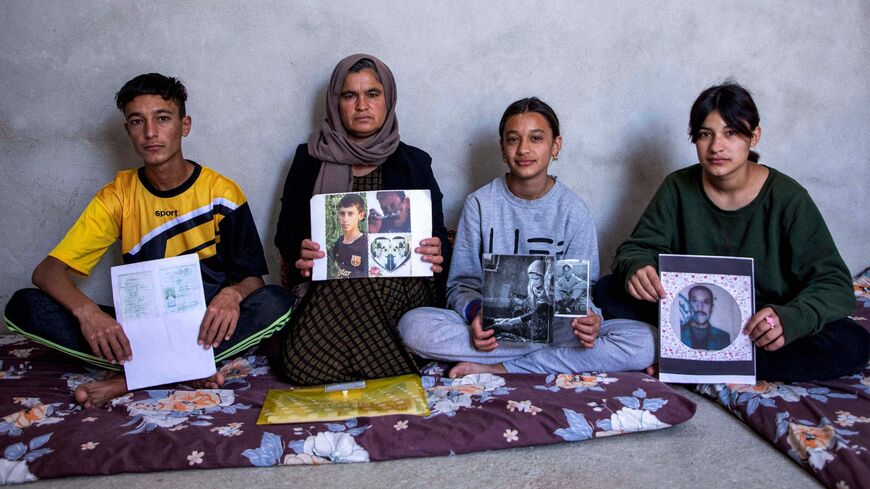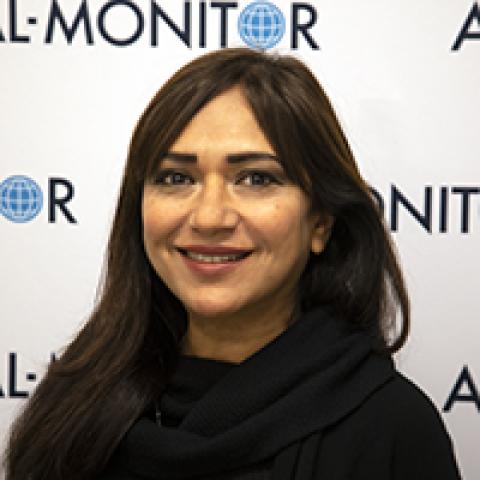Some 27 Yazidi organizations have launched an urgent appeal to Iraq’s central government for $1.5 billion in financial assistance to help rebuild private housing and public infrastructure in their ancestral homeland Sinjar, also known as Shingal, that was decimated by the Islamic State when it embarked on its killing spree there in 2014, killing thousands of members of the ancient ethno-religious sect and abducting their women and children. The massacres are labeled a genocide by the United Nations and a growing number of governments and institutions worldwide.
In the statement, seen exclusively by Al-Monitor ahead of its release later today, the groups decried the paucity of resources allocated to Sinjar in the budget approved by Iraq’s parliament, with a mere $38 million reserved for its rehabilitation from an annual $153 billion overall.
Recalling that the Iraqi prime minister’s office had in the past allocated 500 billion Iraqi dinars ($380 million) for Sinjar, it noted, "The budget was filibustered by some political parties and cut down to 10 percent of its original allocation."
It continued, “Sinjar and other areas inhabited mostly by minorities have received disproportionately low funding over the past nine years and our communities are outraged by the inequality of this budget allocation, considering the severe level of destruction in Sinjar and other areas.” The signatories are calling for the federal government to allocate 1% of the 2023 budget — $1.5 billion — to a specialized fund for the reconstruction of Sinjar.
“Our people need serious financial support to recover from the genocide. The tiny budget allocated to our people is barely sufficient to replace doors of destroyed homes, let alone our towns and villages,” lamented Murad Ismael, the founder of an advocacy group called Sinjar Academy.
To raise awareness of their plight, the signatories are hosting a conference in Baghdad on Aug. 1, to commemorate the ninth anniversary of the bloodletting. “I hope Iraqi policy-makers will make the right decision if the Yazidis’ existence, their survival and recovery from the genocide means something to them,” Ismael told Al-Monitor.
According to the United Nations’ International Organization for Migration, 80% of infrastructure and 70% of housing in the region’s largest urban conurbation, Sinjar city, was destroyed during the conflict that raged across Iraq from 2014 to 2017.
More than 200,000 Yazidis continue to languish in the misery of displacement camps in Iraqi Kurdistan’s Dahuk province, many in flammable nylon tents, some eight years after US-backed Iraqi forces drove the jihadis out of Sinjar proper. “Meanwhile, Iraq has proved capable of generating impressive revenue and passing its largest annual spending budget in history,” the statement noted.
There are no precise figures for the number of Yazidis who have returned to Sinjar. But for those who have, health care, water, electricity and education are in short supply. According to UN data, some 58% of residents lack access to a functional secondary school within five kilometers of their homes.
Thousands of Yazidis remain unaccounted for, including 2,700 women who were tortured and raped by IS and used as domestic slaves. The mass graves of men and boys executed by IS are still being unearthed, adding to the trauma.
Successive Iraqi governments have earmarked resources to rebuild the Yazidis’ homeland but the money has not been disbursed amid protracted political disputes over who will run the area, leaving the Yazidis in administrative limbo. Many, like countless Iraqis of all denominations, are seeking to find their way to the West as the country continues to be plagued by administrative infighting and dysfunction despite its vast energy wealth.
The Kurdistan Regional Government lost control over part of Sinjar when its peshmerga fighters fled the IS onslaught, leaving thousands of Yazidis to the latter’s mercy. The scars of what the Yazidis see as betrayal run deep. The Sinjar Resistance Units (YBS), a Yazidi-led militia with ties to Iran-backed Shiite militias, and the outlawed Kurdistan Workers Party (PKK) established a de facto administration in Sinjar in 2017 that is not recognized by the KRG or federal Iraq. The PKK, which is waging an armed campaign against the Turkish state from its bases in Iraqi Kurdistan, was instrumental in shepherding thousands of Yazidis to safety in August 2014 and in establishing and training the YBS. Turkey periodically targets alleged PKK commanders in Sinjar, causing civilian deaths and further obstacles to the Yazidis’ return.
In 2020, the KRG and Baghdad signed an agreement under which the latter committed $18 million for Sinjar’s reconstruction. But as the governor of Nineveh province, Najim al-Juboury, who is serving as acting mayor of Sinjar, observed in comments to Human Rights Watch, Erbil and Baghdad are “unwilling to spend the funds without first agreeing on who will be responsible for the local administration of Sinjar” and “the discussions have stalled.” Moreover, “They have been unable to agree upon a suitable candidate for mayor, and proposed candidates are often rejected by local Sinjaris who feel marginalized and excluded from the process.”
A “Yazidi Survivors’ Law,” passed in 2021 has not fared much better. Of a total of 10,500 Sinjaris who applied for compensation under the law, about 5,000 claims were approved and “not a single family has received the funds to which they were entitled,” Human Rights Watch reported. The process itself is arduous and expensive with victims complaining that “The amounts of compensation that the Sinjar Compensation Committee recommended are substantially lower than the value of the destroyed home or business or the cost to fully rebuild.”
Meanwhile, many women are unwilling to subject themselves to public grillings by prosecutors deciding their cases. “They ask humiliating questions like ‘how were you raped, how many times,’” said Mirza Dinnayi, an award-winning Yazidi activist who helps women survivors secure asylum in Germany.
Yerevan Saeed, a research associate at the Arab Gulf Institute in Washington, observed that the major Shiite political parties, including the Popular Mobilization Forces (PMU), have pursued a "divide and rule" policy against minority communities like the Yazidis, Christians and Shabaks another ethnic minority in the Nineveh plains. “This strategy has caused tensions and conflicts in the Ninewa plains, with the PMU supporting the Shabaks, leading to property confiscation and hindering the safe return of Christians to their homes,” Saeed told Al-Monitor.
The dependency of minority groups in Iraq on major political parties has been further complicated by the lack of allocated funding in the Iraqi budget for them, Saeed added. “This financial dependence undermines their status in Iraq and forces them into a subordinate position, beholden to the parties in power. As a result, their ability to advocate for their rights and address their specific needs is constrained.”








